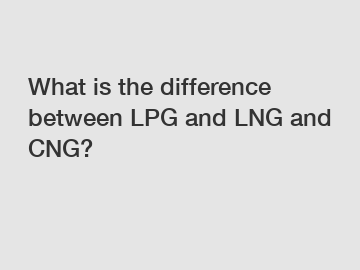What is the difference between LPG and LNG and CNG?
With competitive price and timely delivery, sincerely hope to be your supplier and partner.
What is the difference between LPG and LNG and CNG?
LPG, LNG, and CNG are all alternative fuels commonly used in various applications as a cleaner and more environmentally friendly alternative to traditional fossil fuels. While they may seem similar, there are significant differences between the three in terms of their composition, storage, and usage.

LPG, or liquefied petroleum gas, is a mixture of propane and butane gases. It is derived from natural gas processing and crude oil refining. LPG is stored in pressurized tanks and is highly flammable. It is widely used for domestic heating, cooking, and transportation.
LNG, or liquefied natural gas, is natural gas that has been cooled and condensed into a liquid form for ease of storage and transportation. LNG is predominantly methane (around 90%) with small amounts of other hydrocarbons. It is stored at cryogenic temperatures in special tanks and can be used in various sectors such as power generation, industrial processes, and transportation.
CNG, or compressed natural gas, is natural gas that has been compressed to high pressures for storage and use. CNG consists primarily of methane and is stored in high-pressure containers. It is mainly utilized as a fuel for vehicles such as buses, taxis, and trucks.
The differences between LPG, LNG, and CNG lie in their composition, storage methods, and applications. LPG is a mixture of propane and butane, while LNG is predominantly methane. CNG is also primarily methane, but it is compressed to high pressures rather than liquefied. These variations in composition and state affect the storage and usage options for each fuel.
The choice of fuel depends on several factors, including the purpose for which it will be used and the infrastructure available. LPG is commonly used for heating and cooking in residential buildings because of its easy availability and lower installation costs. It is also widely used as a fuel for vehicles, particularly in regions where the necessary infrastructure is well-established.
LNG, on the other hand, is typically used in areas where natural gas pipelines are not accessible. It is transported in large quantities between countries and can serve as a substitute for traditional fossil fuels in power generation plants or industrial processes. However, the high costs associated with liquefaction and transportation make it less common for smaller-scale applications.
CNG is primarily utilized as a transportation fuel due to its lower emissions and cost-effectiveness. It is particularly popular in the commercial vehicle sector as it meets stringent emissions standards and offers a significant reduction in greenhouse gas emissions compared to conventional gasoline or diesel.
In conclusion, LPG, LNG, and CNG are alternative fuels with distinct differences. While LPG is a mixture of propane and butane, LNG is predominantly methane, and CNG is compressed natural gas. These variations in composition and storage methods make each fuel suitable for different applications. Understanding the differences between these alternative fuels is crucial in making informed choices towards a more sustainable and environmentally friendly future.
Contact us to discuss your requirements of marine LNG filling system supplier. Our experienced sales team can help you identify the options that best suit your needs.



